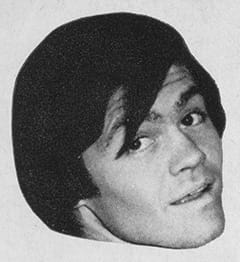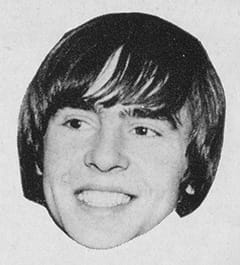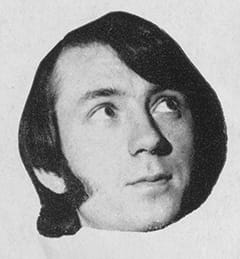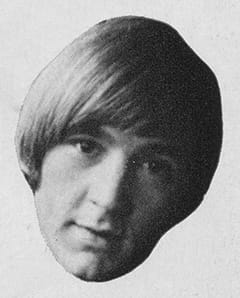We left Peter last month in the middle of his original audition for the Monkees.
At a later date we will go into the actual reasons why each Monkee was selected for the series but right now let’s hear more from Peter about the thoughts that went through his mind when he knew he was one of the lucky ones.
“At last it had given me a direction in which to move. That was important to me. I’d gone through so many different spells in my life up to that point and I couldn’t see which one was going to give me the greatest satisfaction. At school, I’d gone overboard for music, probably to the detriment of my other work. I’d written a lot of poetry, and this was a most interesting subject, but I knew how difficult it was to make a real living at it. I guess that in many different directions I’d taken myself rather too seriously. I really FELT about things going wrong in the world and I had the feeling that by talking about them I could somehow help to put them right.
“Sure I’d been able to make people laugh, specially when we were doing things in clubs and restaurants. But it was something that came AFTER I felt I’d gained their confidence. It was obvious from the start with the Monkees, that I’d be in there pitching for laughs and it suddenly occurred to me that this is something I could be good at. Forget about being deadly serious… plenty of time later for figuring out ways of putting wrongs right and that kind of thing.
“Could be that the audition with the Monkees came at exactly the right time in my life. Another few months later could have been too late. I could have wandered off in yet another direction—one from which there would have been no return.”
Crucial Permalink
We’re reaching the crucial point in the Monkees story now. Davy, under contract to Columbia Pictures, knew about the group that was to become an international rave. Peter, Mike and Micky had been conditioned, getting themselves sifted out from hordes of other would-be Monkees.
Micky Dolenz is a natural clown, as everybody who has seen a Monkee show will appreciate. But he also owns up: “Sometimes I overdo things. I take a gag and invent things around it and end up losing my way. All through the Monkees’ scene, I’ve been aware of this weakness in my make-up…”
Even so, it was his ability to tackle impromptu situations and come out with a real big belly-laugh that helped sell the Monkee sponsors on the belief that these four boys were going to be the biggest thing in the entertainment industry.
We’ll go back, in our story now, to Micky… but Davy fans should be told that there is a lot yet to come about his first meetings with the others and the planning that went around getting a hundred per cent British boy into the line-up.
Says Micky: “When you start out on a new television series, it’s not just a matter of getting in the studios and filming. There is a great deal of chat behind the scenes. There are policies to think about. And when we first came face to face with the big men behind the scenes, well… we felt pretty darned nervous. These guys, once it was agreed that the four of us would become the Monkees, talked so fast and so dynamically that we felt what we probably were… greenhorn kids suddenly in the middle of a multi-million pound deal. So you can understand, I hope, how it was that we had little to say for ourselves.”
Big men Permalink
This, remember goes back to the early part of 1966. The “big” men concerned were Bert Schneider, who was 34 and very much with it—the son of the president of Columbia Pictures; Screen Gems, the company “organising” the Monkees, was the television department of the movie company… and there was Bob Rafelson, 33, and very much with it. And, every bit as important, there was Don Kirshner, who was going to handle the production of their recordings.
All this came about in what Columbia Picture employees have nicknamed “no-man’s land”. It’s a part of the main block, but far from the most attractive section. A rather shabby green building, with the stairways crumbling and the walls far from spotless. There’s a second-floor reception room, cluttered with magazines and posters, through which the boys had first filed as they turned up for their very first auditions.
Strange, those posters. There was one saying “War Is Not Healthy For Children and Other Living Beings”. And another with a picture of President L.B. Johnson which bore the statement: “He Who Meddles In A Quarrel Is Like One Who Takes A Passing Dog By The Ears”. A reference, of course, to the “controversial” pictures of the President hoisting his pet dogs in the air by the ears…
But it was in this suite of offices that the early planning went on. Now we’ll hear, in turn, from all the Monkees on their recollections of the early months. First, Micky: “We knew our own limitations but it was pretty tough hearing them expressed publicly at meetings. Like I was always regarded as the mimic of the scene. If somebody wanted a few lines of tough-guy dialogue portrayed, they’d turn to me. I was asked how well I could sing and I was honest about my limitations, but in the end they reckoned my voice was the best for the early recordings.
“Yet both Peter and Mike had done a lot of singing—so had Davy, but more in the musical comedy sense. We hadn’t any idea, of course, in those early days, just how big the Monkee television series was going to be—or how the records were going to do in the charts.
“Maybe you know that in America the important thing is to SELL a television series. Somebody has to be impressed enough to buy the series, sponsor it. So it had to be good. But, once we were picked, we admit we had to be trained in all sorts of things. So in came coaches to teach us what is known as improvisational acting and all the other things we had to do.
“It was like being back at school again… with some rather strange personal memories for me. Remember that I’d done a lot of my childhood schooling in the sort of shadows of show business. Well, here it was all over again. Big-time show-business was going on all around with us in the middle learning about the things we didn’t know.”
But maybe the worst thing was that this whole operation had to be kept very much on the secret list. It was no good building up a brand-new, sensational series about a zany pop group only to find that somebody else had stolen the idea. So the whole build-up was carried through under a sort of cloak of security. And the boys really did work hard. There was a lot of money at stake in the project and it was important that everything was exactly right.
Interesting Permalink
And here comes some interesting gen [sic] from Coco, Micky’s sister. She tells us: “Micky and I had often sung songs together, putting on shows at home for our parents. Like we’d team up on a big song of the moment, like ‘Wayward Wind’, the Gogi Grant hit. I’d come walking on holding a candle, with all the lights out—and Micky would be hiding behind the couch with a board of card, making wind so the candle flickered and finally went out.
“Micky wrote songs, you know. Some of them were pretty good. He’d come up with the main ideas and maybe we’d change them around to suit our voices. He wasn’t too good on musical arrangements early on, but he’s really studied since then… and we still get together and sing whenever he comes home.
“Sometimes we’d gotten pretty close to making records. One guy came and gave us the ‘I’ll make-you-stars’ routine but nothin’ happened. And there was another time when a guy had the publishing rights to a song we wanted to do, but wouldn’t let us have them on the grounds that nobody knew who we were.
So there could have been another singing Dolenz… had it not been for the Monkees! An ironic little twist. But Micky, after the Monkees had got away, was most anxious that his sister should go to college, rather than go after a singing career—and he promised her a car if she’d agreed. Says Coco: “I was thinking about not going to college but, deep down inside, I guess I wanted to. So I did, and it had nothing to do with Micky’s promise.”
And at Christmas that year, as the Monkees’ name was growing very fast, Micky told Coco that he couldn’t get her a car, but he was driving up in a rented automobile and would see her and give her a present, a big Japanese folding paper kit which Coco enjoyed a lot. Then, suddenly, he said: “By the way Coco, I didn’t really come up in a rented car. It’s a Le Mans… and it’s yours.” Whereupon he dug in his pocket and produced the keys to it.
Anyway, Monkee rehearsals went on at Screen Gems. A pilot film was created. And NBC, the big television company, decided to hold a get-together of all their artists at the Chasen restaurant, there in June, 1966. This is quite a while before the first of the Monkee series hit the screen. Among the guests were the affiliates, the men who decide what their stations will carry, plus the stars of the new series about to start in the autumn.
Trouble here was that the affiliates were mostly soberminded characters who had a deep mistrust of artists who sported long hair and fitted into the beatnik category. The scriptwriters had done a short sketch to show off the Monkee personalities, but the evening ran on very late and right at the end the boys decided they wouldn’t do the sketch as written.
But more about that, and the repercussions, next month.
More Next Month






